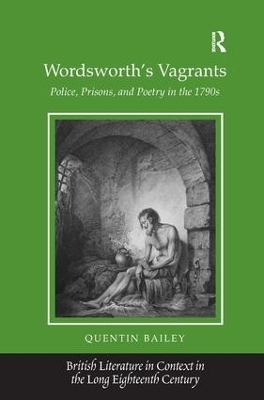
Wordsworth's Vagrants
Routledge (Verlag)
978-1-4094-2705-6 (ISBN)
Wordsworth's Vagrants explores the poet's treatment of the 'idle and disorderly' in the context of the penal laws of the 1790s, when the terror of the French Revolution caused a crackdown on the beggars and vagrants who roamed the English countryside. From his work on the Salisbury Plain poems through to the poetry about vagrants, beggars, and lunatics in Lyrical Ballads, Quentin Bailey argues, Wordsworth attempted to imagine a way of relating to the vagrant and criminal poor that could challenge the systematizing impulses of William Pitt and Jeremy Bentham. Whereas writers had previously relied on sensibility and fellow-feeling to reveal the correct ordering of society, Wordsworth was writing in a period in which legislators, magistrates, and commentators agreed that a more aggressively interventionist approach and new institutional solutions were needed to tackle criminality and establish a disciplined and obedient workforce. Wordsworth's interest in individual psychology and solitude, Bailey suggests, grew out of his specific awareness of the Bloody Code and the discussions surrounding it. His study offers a way of reading Wordsworth's poetry that is sensitive to his early radicalism but which does not equate socio-political engagement solely with support for the French Revolution.
Quentin Bailey is an Assistant Professor at San Diego State University.
Introduction Prisoners, Poetry, and the “Jacobin Creed”; Chapter 1 A “rapid and alarming increase of crimes”: Law and Order in Eighteenth-Century England; Chapter 2 “Tyranny and Implements of Death”: Crimes, Punishments, and the “distracted times” of 1792–1795; Chapter 3 A “Traveller … Upon the Plain of Sarum”: Sacrificial Altars, Penal Reform, and the Salisbury Plain Poems; Chapter 4 “If Good Angels Fail”: Government, Lawlessness, and Sympathy in The Borderers; Chapter 5 “Dangerous and Suspicious Trades”: The Pedlar, the Board of Police Revenue, and the Poetry of Human Suffering; Chapter 6 “Have you any honest means of livelihood, and if so, what is it?”: Idle and Disorderly Persons in the 1798 Lyrical Ballads; Chapter 7 “Laugh and be gay, to the woods away!”: Madness and the Limits of Poetic Knowledge; conclusion Peter Bell and “the Spirits of the mind”;
| Erscheint lt. Verlag | 28.9.2011 |
|---|---|
| Verlagsort | London |
| Sprache | englisch |
| Maße | 156 x 234 mm |
| Gewicht | 589 g |
| Themenwelt | Geisteswissenschaften ► Sprach- / Literaturwissenschaft ► Anglistik / Amerikanistik |
| Geisteswissenschaften ► Sprach- / Literaturwissenschaft ► Literaturgeschichte | |
| Geisteswissenschaften ► Sprach- / Literaturwissenschaft ► Literaturwissenschaft | |
| ISBN-10 | 1-4094-2705-6 / 1409427056 |
| ISBN-13 | 978-1-4094-2705-6 / 9781409427056 |
| Zustand | Neuware |
| Haben Sie eine Frage zum Produkt? |
aus dem Bereich


